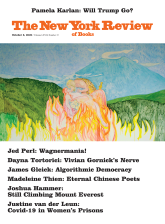In response to:
The Intent Was Genocide from the July 2, 2020 issue
To the Editors:
I applaud both Jeffrey Ostler’s fine book Surviving Genocide and Peter Nabokov’s insightful review of it [NYR, July 2]. Framing Ostler’s work as reflective of contemporary interest in settler colonial studies (particularly its focus on the process of elimination) and genocide studies (most notably Benjamin Madley’s 2016 study of California, An American Genocide) is apt. But missing in that framework is some recognition of the connection these two viewpoints share with the “new” Indian history of the past generation, a school of historical studies that has done so much to alter general understandings of Native history and the US conquest of North America. That older approach emphasized Native agency, tribal adaptation, and Indian survival. The argument was that American Indians were not passive victims of conquest; they were agents of history. We older scholars can feel both “chastened” and enlightened by these trends, but we continue to search for agency and to see more in the past than stories of “metal striking bone.” Native perspectives and Native actions link this newer scholarship to its predecessor. They also reveal that concentrating exclusively on genocide and colonial exploitation can obscure history.
As hard as it is to imagine, there was agency amid the horrific cruelty of the past. Rapacious violence from New England to California did not produce a national “extirpation” (though to be sure, removal, boarding schools, and reservation poverty came close). And in the wake of American cruelty, Native people acted: Cherokees rebuilt their nation in Indian Territory; Navajos, freed from mass incarceration, walked back to their homeland; Ojibwe villages removed from the Minnesota landscape returned, reformed, and resisted. The point is twofold. First, the American genocide was not the product of a single policy pronouncement or government action; it was the product of history—ideas in time, distinctive circumstances, human greed, racist ideology (another human creation), and xenophobia. Second, the salvation of Native people—and of the US as well—has been a tenacious, clear-eyed tradition of resistance.
And as useful as the settler colonial formulation has been as a substitute for earlier tropes of “expansion” and “conquest,” it has little space within it for Native agency. If settler colonialism is ultimately “a process not an event,” as Patrick Wolfe argued, then historical events all run one way. There is no history, it seems, only doomed resistance and inevitable defeat. And yet Native leaders from the seventeenth century forward were willing to negotiate treaties, learn new languages, travel to foreign capitals, publish broadsides, and adopt new religions as they struggled to force newcomers to recognize their humanity and sovereignty.
Today’s Native leaders are heirs to this long tradition of diplomacy, tribal advocacy, cultural patriotism, and dogged resistance. They inspired the survival and cultural survivance we see around us. Some might dismiss this call for nuance as a form of self-deception practiced by those who deny the cruelty of the colonial process, but Native actors have long shared that viewpoint. It drove John Ross to defend the Cherokee nation’s integrity before—and for decades after—their forced removal from Georgia. It drove the Dakota intellectual Charles Eastman to declare a century ago in the darkest days of Native life, “I am an American; I am an Indian.” It inspired the Paiute activist Sarah Winnemucca to travel the nation pleading for human rights for her people. And it no doubt sustained the Creek leaders who were victorious in the Supreme Court in early July.
I am pleased that Ostler’s book is out there and happy that my younger colleagues are engaged with it. But I also hope that exploring its thesis does not mean “the end of history.” There are many more stories out there—and many more Native voices—that demand our attention.
Frederick E. Hoxie
Professor Emeritus
University of Illinois
Urbana/Champaign, Illinois
This Issue
October 8, 2020
Our Most Vulnerable Election
The Cults of Wagner
Simulating Democracy



